Back in September, we hosted the first Addressing Imbalance Live event.
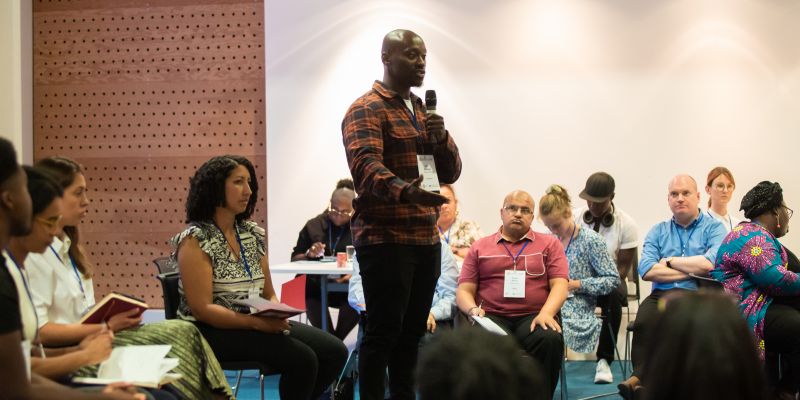
Addressing Imbalance is a Good Finance programme that launched in late 2020 in response to the team’s collective frustrations around the inequalities only exacerbated by the pandemic. At Good Finance we seek to be the trusted source of information for charities and social enterprises around social investment, but with stats and figures screaming that under-represented or marginalised communities were facing disproportionate barriers to accessing this type of finance, we recognised that we needed to act.
The Addressing Imbalance programme launched in partnership with 7 organisations, all of whom share the goal of creating a more equal society and channelling funding to the people and communities who need it the most. Without their vision, dedication and critical feedback, the programme would not have been possible.
Findings from Social Enterprise UK No Going Back: State of Social Enterprise Survey 2021 found that 44% of people with disabilities expect to be rejected when applying for finance. 55% of people from racialised communities feel discouraged from even applying.
Addressing Imbalance Live was an opportunity for people to come together to connect, network and learn about the role of social investment and the support available to help their organisations. We wanted to have open and honest conversations – showcasing success stories but also reflecting on where we are as a sector and the changes needed to make social investment a more inclusive space.
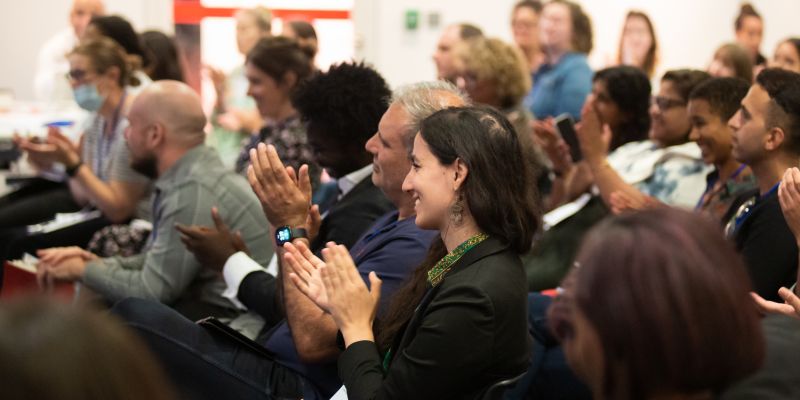
The agenda kicked off with introductory session from Stephen Bediako, founder and social entrepreneur. ‘It’s time to open up enterprise for all’ said Stephen, who shared his 5 ideas of how social investment can be made more accessible:
- Investment expertise should be the enabler, not the leader;
- Investment should be catalytic and risk-taking, we need to move away from risk aversion;
- We need greater diversity within the investment process – from investment committees, fund management and research that helps inform where investments are made;
- We need diverse institutions willing and able to invest in diverse organisations – Stephen cited his work with Pathway as an example of how this is being put in process;
- We don’t need the status quo to get out of the way – we just need to share the space, and then we can create more opportunity for everyone.
- Stephen’s session was a great start to the day and a reminder that to move forward as a sector we need collaboration, with lived experience at the helm.
Next up, was Good Finance’s Ishita Ranjan and Annie Constable who gave an introduction to social investment and spoke about some of the tools and resources offered by Good Finance. It can be hard to know where to start, but the ‘Is it right for us?’ tool is always a good place to begin!
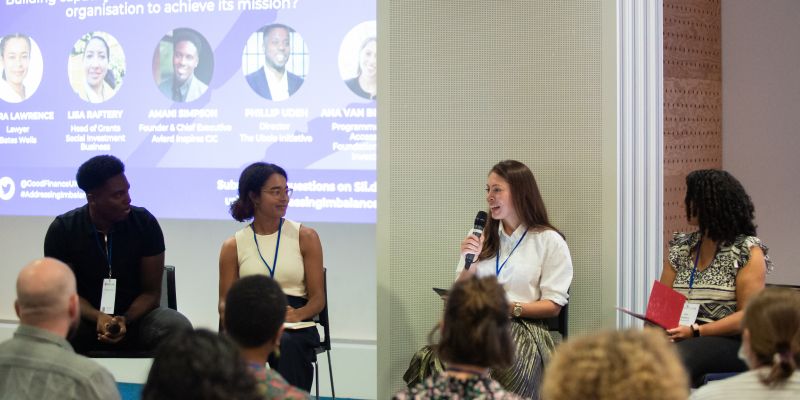
Getting your business in shape before you consider social investment is crucial. For example, you’ll need to consider your legal structure, business plan and revenue streams. Hearing from Lisa Raftery (Social Investment Business), Amani Simpson (Aviard Aspires CIC), Samara Lawrence (Bates Wells) and Ana Van Bilsen Irias (Access – The Foundation for Social Investment) gave attendees insight into some of the support available, from legal advice, accelerator programmes and grant funding.
When asked what the biggest challenges they face within their business were, 42% of attendees cited access to finance as the biggest challenge, closely followed by capacity (34%). The panel shared useful resources which we have incorporated into our brand new Pre-Investment Support page.
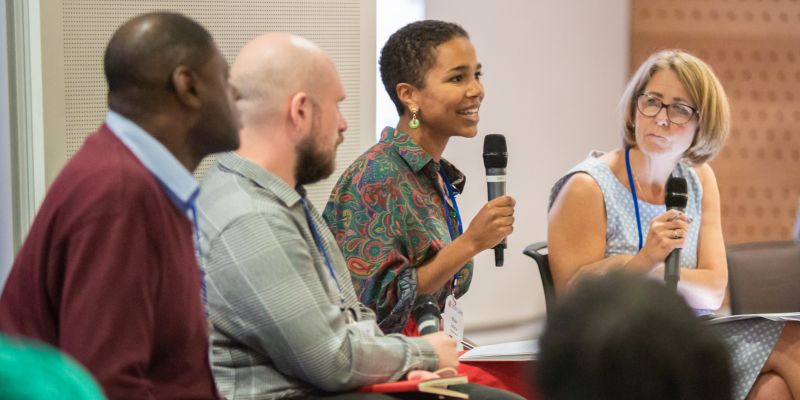
There is no ‘one-size-fits-all’ option for social investment, but too often under-represented groups are left out of the conversation around the type of funding their communities need. ‘Using your voice to influence investors’ examined good practice and examples where lived experience was really taken into account by funders and explored more ways by which learnings from frontline leaders and their communities could be embraced and incorporated by investors.
An informed discussion between panel members Rhea Fofana (UnLtd), Duncan Fogg (Shift), Lisa Hilder (Hull Women’s Network), Kunle Oluolde MBE (Voice4Change England) and session chair Melanie Mills (Big Society Capital) highlighted the importance of embracing lived experience within the fund creation process to create financial products that really work for the communities they are designed to help. The key takeaways? The sector is moving in the right direction, however there needs to be more awareness that a blanket approach clearly isn’t working . On the investor side, flexibility in approach, understanding nuances and really getting to know and understand potential investees is key.
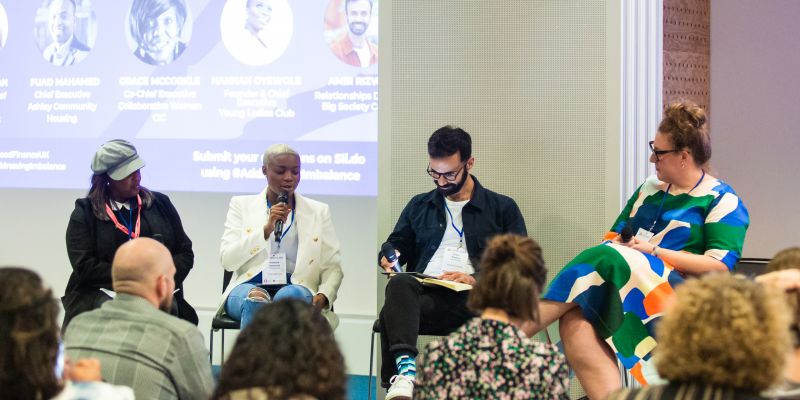
Theory is all well and good, but nothing brings social investment to life more than real life stories. We heard directly from Lizzie Jordan (Think2Speak), Grace McCorkle (Collaborative Women) and Hannah Olewole (Young Ladies Club), all of whom have taken on investment within their organisations. Hearing their stories was not only inspirational, but also refreshing as the panel, chaired by Amir Rizwan (Big Society Capital) did not hold back with candid insights and an honest reflection on the pros and cons they had experienced with social investment.
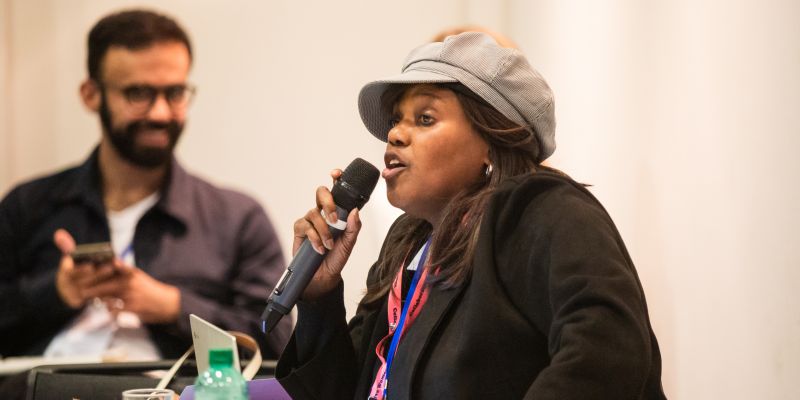
The final panel of the day heard from Kevin Osborne (Create Equity, MeWe360) and Patricia Hamzahee, (Social Enterprise UK, Integriti Capital), chaired by Good Finance’s Ishita Ranjan. This session offered insightful reflections on some of the points raised in previous sessions, with a clear call to address the structural inequalities and systems that perpetuate wealth inequality. ‘Money acts as a proxy to power’ Kevin emphasised, highlighting that if we really want to address the power imbalance, more money needs to be directed towards organisations led by people from under-represented communities. ‘Giving up power is a powerful move in itself’ he reflected.
‘Collaboration, co-creation and community’ are key words, Patricia added, calling for the sector to explore the different approaches which can be made to catalyse radical and systemic change. Some funders are really trying to scrutinise their processes and take more risk, she says, emphasising that addressing imbalances and targeting inequity makes economic sense and benefits society as a whole. We need to ‘think bigger and think more equitably’ she concludes.
The pace of change may be frustratingly slow, but the power and passion that was demonstrated throughout in the room and online was a positive reminder of how much it is needed. It’s crucial that as an organisation we support this movement and rally other organisations to deliver on the commitment to fund more equitably.
We’re extremely grateful to the speakers, partners and individuals whose feedback and insights helped shape the programme, and to all those who attended for their time and participation in the event.
Addressing Imbalance Live would not have been possible without funding secured via The Connect Fund, managed by Barrow Cadbury Trust in partnership with Access – The Foundation for Social Investment.
This funding allowed us to support attendees in practical ways which included travel, attendance and accommodation bursaries and additional accessibility measures. Keep an eye out for part 2 of this blog where we reflect on our key learnings and next steps.
If you missed any of the sessions, catch up on demand here.
